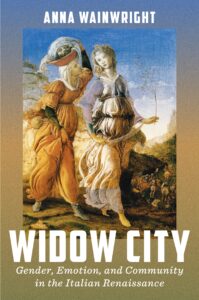by Anna Wainwright
Widow City: Gender, Emotion, and Community in the Italian Renaissance investigates the evolving role of the widow from allegorical subject to author in medieval and early modern Italian literature, from canonical authors such as Dante, Petrarch, and Boccaccio, who constructed a rich poetic vocabulary around widowhood, to the numerous widowed writers who rose to prominence in the sixteenth century and radically changed the conversation on public mourning, offering an entirely new perspective on widowed identity. Engaging with broader intellectual discussions around gender performance, the history of emotions, the politics of mourning, and the construction of community, Wainwright argues that widows served as key models in a literature of exemplarity, demonstrating the proper way to grieve and mourn as a citizen, and are therefore key to broader intellectual understandings not just of literature but of community and civic life.
About the Author
Anna Wainwright is Assistant Professor of Italian Studies and Core Faculty in Women and Gender Studies at the University of New Hampshire.
Extras
Listen to author Anna Wainwright discuss Widow City: Gender, Emotion, and Community in the Italian Renaissance with the New Books Network's Dr. Jana Byars here:
Reviews of Widow City: Gender, Emotion, and Community in the Italian Renaissance
“
Widow City is an impressive study of the significance of widowhood in Italian Renaissance literature. Through subtle analyses of canonical authors such as Dante, Petrarch, and Boccaccio, who constructed a rich poetic vocabulary around widowhood, to the numerous widowed writers such as Vittoria Colonna and Francesca Turina, who rose to prominence in the sixteenth century and drastically changed the conversation on public mourning, Wainwright singles out the evolution of a remarkably powerful discourse. What she convincingly labels as “poetics of widowhood” becomes nothing but a key to a broad intellectual understanding of literature, community, and civic life in early modern Italy.
”
- Unn Falkeid, University of Oslo
“
In
Widow City Anna Wainwright analyzes the evolving role of widow from subject to author in late medieval and early modern Italian literature. Wainwright probes the boundaries of gender in the poetics of widowhood as she moves from the
tre corone to the radical reframing performed by Italian Renaissance women authors, many widowed, whose efforts led to a boom in women’s writing unmatched elsewhere in Europe. This book does honor to those women, as Wainwright brilliantly illuminates the story of widows and widowhood in Italian letters.
”
- Teodolinda Barolini, Columbia University

